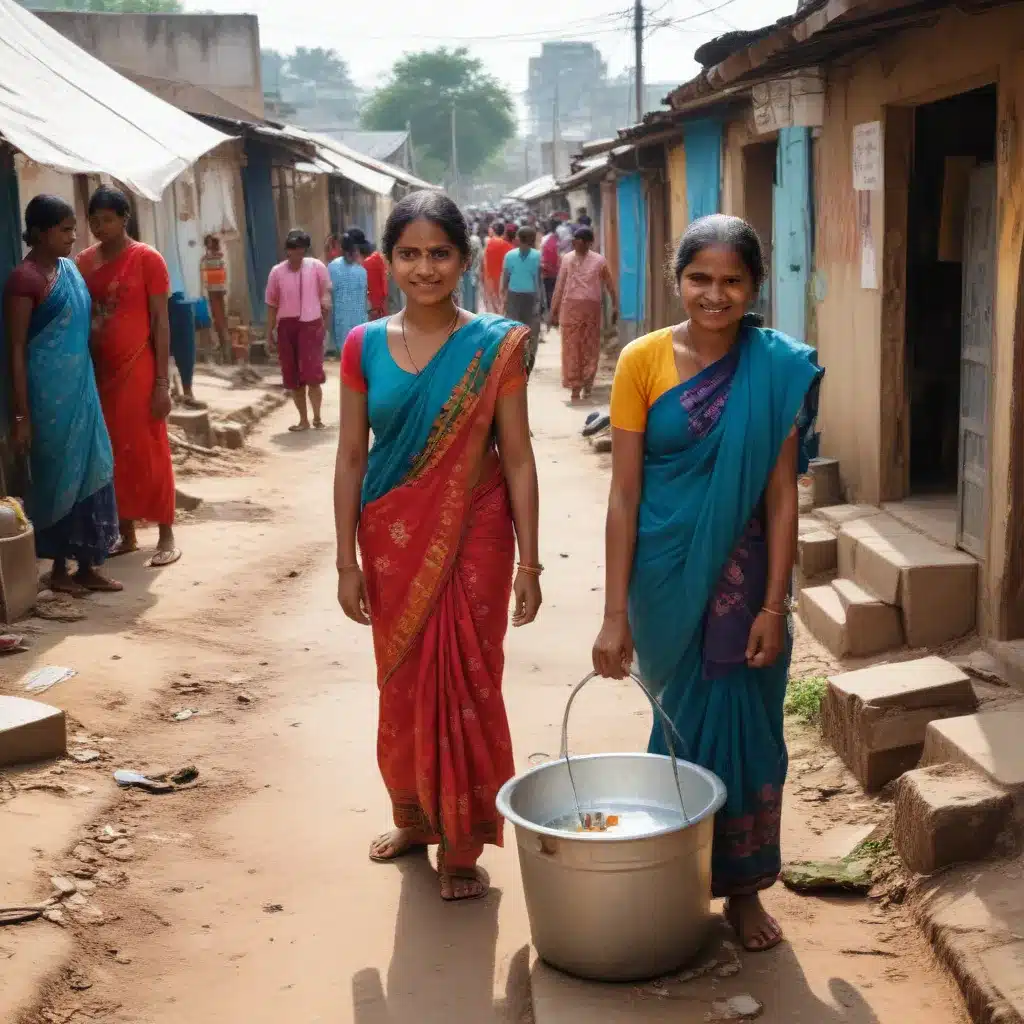
Uncovering the Hidden Challenges in Slum Communities
Hyderabad, the bustling capital of Telangana, is home to a significant population living in informal settlements, commonly referred to as slums. These communities, often marginalized and overlooked, face a complex intersection of challenges related to water, sanitation, hygiene (WASH), health, and nutrition. Unraveling this web of interconnected issues is crucial for promoting equity and empowering these vulnerable residents.
Navigating the WASH Landscape in Slums
Access to safe and reliable water, adequate sanitation, and proper hygiene practices are the foundation for maintaining good health and preventing the spread of waterborne diseases. However, in Hyderabad’s slums, this WASH landscape is fraught with obstacles. Unreliable water supply, lack of proper sewage systems, and inadequate waste management often leave residents with limited options for meeting their basic needs.
Residents in these informal settlements may resort to drawing water from contaminated sources, sharing communal toilets, or resorting to open defecation, all of which contribute to the proliferation of diarrheal diseases, cholera, and other infectious illnesses. The resulting impact on child health and nutrition is significant, as diarrhea and malnutrition often go hand-in-hand, trapping families in a vicious cycle of poor health and limited development.
“The lack of clean water and proper sanitation facilities in our community is a daily struggle. Our children are constantly at risk of falling ill, and it’s a constant battle to keep them healthy and nourished.” – Shanti, a resident of Banjara Hills slum in Hyderabad.
Unraveling the Health and Nutrition Nexus
The interconnected nature of WASH, health, and nutrition is particularly evident in the experiences of children living in Hyderabad’s informal settlements. Inadequate access to clean water and proper sanitation not only increases the risk of waterborne diseases but also exacerbates issues of malnutrition and stunting.
| Health Outcome | Prevalence in Hyderabad Slums | National Average |
|---|---|---|
| Diarrhea in children under 5 | 26% | 9.2% |
| Acute Respiratory Infections in children under 5 | 19% | 6.1% |
| Stunting in children under 5 | 35% | 34.7% |
The high prevalence of diarrheal diseases and acute respiratory infections in slum communities, often exacerbated by poor WASH conditions, directly contributes to the alarmingly high rates of stunting and malnutrition among young children. Malnourished children are more susceptible to these illnesses, and the resulting cycle of poor health and inadequate nutrition can have long-lasting impacts on their physical and cognitive development.
“My daughter has been sick with diarrhea multiple times this year. I worry constantly about her getting the proper nutrients she needs to grow and thrive. The lack of clean water and sanitation facilities in our community makes it so difficult to keep her healthy.” – Radha, a mother living in the Charminar slum.
Navigating the Intersection of WASH, Health, and Nutrition
Addressing the intersection of WASH, health, and nutrition in Hyderabad’s informal settlements requires a multifaceted approach that tackles the root causes of these interconnected challenges. Sustainable solutions must go beyond just improving infrastructure and focus on empowering communities, strengthening health systems, and promoting integrated, holistic interventions.
One such initiative is the Joint Action for Water (JAW) program, which takes a comprehensive approach to addressing these issues. JAW partners with local communities to improve access to safe water, construct household and community sanitation facilities, and promote hygiene education. By integrating these WASH interventions with health and nutrition services, the program aims to break the cycle of poor health and malnutrition, particularly among young children.
“The JAW program has been a game-changer for our community. By providing clean water, building toilets, and educating us on proper hygiene practices, we’ve seen a significant improvement in the health and well-being of our children. It’s a holistic approach that addresses the root causes of these interconnected problems.” – Asha, a community leader in the Banjara Hills slum.
Empowering Communities, Strengthening Resilience
Sustainable change in Hyderabad’s informal settlements requires the active participation and empowerment of local communities. JAW’s approach emphasizes community engagement, ensuring that residents have a voice in the design and implementation of interventions. This not only fosters a sense of ownership but also builds the capacity of community members to advocate for their rights and maintain the improvements made to their WASH infrastructure.
Furthermore, by integrating health and nutrition services into their WASH interventions, JAW is addressing the broader social determinants of health that shape the well-being of slum residents. This comprehensive approach recognizes the complex, intersecting factors that influence child health and development, and seeks to strengthen the overall resilience of these marginalized communities.
“The JAW program has empowered us to take charge of our own health and well-being. We’re no longer just passive recipients of aid, but active participants in creating a better future for our families and our community.” – Sumati, a resident of the Charminar slum.
Conclusion: Towards a Holistic and Equitable Future
The challenges faced by Hyderabad’s informal settlements in the realm of WASH, health, and nutrition are daunting, but not insurmountable. By addressing these interconnected issues through a comprehensive, community-driven approach, programs like JAW are paving the way for a more equitable and resilient future for slum residents.
As we look ahead, it is essential that policymakers, development agencies, and local stakeholders prioritize the needs of these marginalized communities and invest in integrated, inclusive solutions. By empowering slum residents, strengthening health systems, and fostering collaborative partnerships, we can transform the lives of those living in Hyderabad’s informal settlements and ensure that no one is left behind in the pursuit of universal health and well-being.

